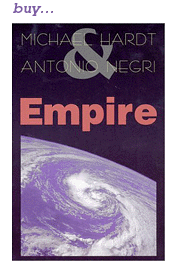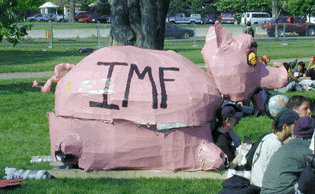Home
Mail Articles
Stats/current
Supplements
Subscriptions
Links
The following article appeared in Left
Business Observer #96, February 2001. It retains its copyright
and may not be reprinted or redistributed in any form - print,
electronic, facsimile, anything - without the permission of LBO.
Blows against Empire
Michael Hardt and Antonio Negri, Empire (Harvard
University Press), 512 pp., $36.95. [hardcover], $18.95 [paperback].
We hear a lot about "globalization" these days, but its meaning
is often taken to be self-evident - as is its value (good if you're
orthodox, bad
if you're a rebel).
That's neither intellectually nor politically satisfying. Now,
with Empire, we have an attempt to think freshly about the world
we live in, and the possibilities for making it better. There's
a lot wrong with the book, but it's an excellent starting place.
Michael Hardt  teaches
in the literature program at Duke. Antonio Negri is described on the book jacket as "an
independent researcher and writer and an inmate at Rebibbia Prison,
Rome." Negri's crime was armed insurrection against the Italian
state; the state had fingered him as the secret leader of the
Red
Brigades in the 1970s, an implausible charge he has always
denied. He is the leading thinker of autonomist Marxism, an approach
which emphasizes the creative and revolutionary power of workers
on their own, apart from state and party. Next to typical left
pessimism, autonomists can seem dreamily optimistic, seeing struggle
and victory where others see apathy and defeat. Where most people
(across the political spectrum) see capital as acting and labor
as reacting, autonomists see capital as the reactive side of the
relation.
teaches
in the literature program at Duke. Antonio Negri is described on the book jacket as "an
independent researcher and writer and an inmate at Rebibbia Prison,
Rome." Negri's crime was armed insurrection against the Italian
state; the state had fingered him as the secret leader of the
Red
Brigades in the 1970s, an implausible charge he has always
denied. He is the leading thinker of autonomist Marxism, an approach
which emphasizes the creative and revolutionary power of workers
on their own, apart from state and party. Next to typical left
pessimism, autonomists can seem dreamily optimistic, seeing struggle
and victory where others see apathy and defeat. Where most people
(across the political spectrum) see capital as acting and labor
as reacting, autonomists see capital as the reactive side of the
relation.
Dispersion
Empire is an extremely ambitious attempt to theorize
the economic and political world today. Though clearly in a Marxist
tradition, it's hardly orthodox. Though it pays appropriate homage
to Lenin's famous pamphlet on imperialism, there's little that's
Leninist about its analysis or especially its politics.
Maybe the best place to start a consideration is to focus on
the dispersed nature of power today, a decentered structure Hardt
and Negri call Empire. Take the ownership and governance of giant
corporations. Early firms were owned generally by a single capitalist
or a small network of partners. By the end of the 19th century,
the likes of Morgan and Carnegie were assembling small firms into
giant combinations like U.S. Steel. By the early 20th century,
it was easy to conclude, as Lenin (and Rudolf Hilferding, in his classic Finance Capital) did, that industry was
coming under the ownership of a handful of big banks, arranged
in cartels often protected by price-fixing and high tariffs. Things
didn't turn out that way. Now, giant firms are owned by thousands,
even millions, of shareholders, and it's hard to point to a controlling
force other than "the markets." And individual workplaces
don't really count for much these days; the entire world is now
an integrated workplace, a giant "social factory."
Global political power is also dispersed. Unlike 19th century
imperialism, when Nation X owned Colony Y, today's hierarchy is
harder to specify. There are few cases of outright ownership,
and the boundaries between the First and Third Worlds are getting
blurrier - literally in the case of the U.S. - Mexico border,
but also in the sense of the movements of large numbers of migrants
from South to North, and the proliferation of skyscrapers and McDonald's in the South.
Cartels and classic imperialism turned out to be blocks to
capitalist development. Cartels inhibited competition, capitalism's
disciplinarian, as well as technological innovation, jointly leading
to inefficiency and stagnation; tariffs, currency regimes, and
other instruments of colonial preferences blocked trade and capital
flows, inhibiting the development of a single world market; and
frequent imperial wars promoted physical and financial ruin that
were obstacles to the accumulation of capital. By contrast, the
age of Empire is one of deregulation and the promotion of trade
and capital flows - all designed to encourage competition, technological
innovation, and the integration of the world into a single market.
Wars are reserved for "rogue states" that refuse to
get with the program.
Evolution
Empire evolved over the last several decades, as capital's
response to the great rebellions of the 1960s and 1970s. In the
rich countries, a variety of rebellions flared, from traditional labor
movements to new feminist, ethnic, ecological, and sexual movements.
In the so-called Third World, there were numerous wars of national
liberation, combined with an increased assertiveness by the poorer
countries demanding higher commodity prices and a global redistribution of power and income
- a movement that peaked with an oil embargo and the U.S. defeat
in Vietnam. It looked like domestic and international hierarchies
of power were under serious threat.
But the masters rose to the challenge. Hardt and Negri are
light on the details, but the history is a familiar one: the creation
of a deep global recession in the early 1980s, which scared the
hell out of First World labor and threw the Third World into the
debt crisis; an acceleration of technical change, which produced
the familiar cybergadgetry
of today; the dispersion of production  into smaller,
more flexible units often far from population centers and each
other; cutbacks in the more benign aspects of the state, like
social spending, and an increase in the punitive ones, like jails;
the casualization of employment, along with speedup and givebacks;
and the propagation of a whole new ideology, which repositioned
the Keynesian social democratic state as obsolete and stifling,
and the new world of hypercapitalism
as a realm of freedom
and adventure.
into smaller,
more flexible units often far from population centers and each
other; cutbacks in the more benign aspects of the state, like
social spending, and an increase in the punitive ones, like jails;
the casualization of employment, along with speedup and givebacks;
and the propagation of a whole new ideology, which repositioned
the Keynesian social democratic state as obsolete and stifling,
and the new world of hypercapitalism
as a realm of freedom
and adventure.
No turning back
So what's to be done about Empire? A lot of thinkers and activists
would love to recover a lost
world of nation-states or self-sufficient localities. Hardt
and Negri will have none of this:
[W]e insist on asserting that the construction of Empire is
a step forward in order to do away with any nostalgia for the
power structures that preceded it and refuse any political strategy
that involves returning to that old arrangement, such as trying
to resurrect the nation-state to protect against global capital.
We claim that Empire is better in the same way that Marx insists
that capitalism is better than the forms of society
and modes of production that came before it. Marx's view is grounded
on a healthy and lucid disgust for the parochial and rigid hierarchies
that preceded capitalist society as well as on a recognition
that the potential for liberation is increased in the new situation.
This isn't a popular view. But their critique of the nation-state
deserves serious attention. For example, though there are undoubtedly
progressive aspects to classic national liberation struggles -
those directed against colonial powers - it's a recurrent fact
of history that once established, nation-states thrive on creating
new hierarchies, and by excluding, to some degree or other, those
not deemed members of the tribe. Any progressive political movement
today should be looking beyond hierarchy and exclusion towards
a society that's egalitarian and truly universal (not the counterfeit
kind proffered in ads).
In our normal work lives, we're all linked - often invisibly
- with a vast network of people, from across the office or factory
to the other side of the world. Standard globalization narratives, mainstream
or critical, often efface this fact, making capital into the dominant
creative force rather than the billions who produce the goods
and services that the world lives on. That cooperative labor deserves
to be acknowledged in itself, as the creative force that it is,
but also a source of great potential power. Empire uses a lyric
from Ani DiFranco as one of its epigraphs: "Every tool is
a weapon if you hold it right." They could have also used
a line from Patti Smith: "We created it. Let's take it over."
Strategies
Not, of course, that such a takeover is simple or imminent.
But it would help if we had a better appreciation of the struggles
that are going on in our supposedly somnolent time. To Hardt and
Negri, the most visible rebellions of our time - Tiananmen Square,
the Intifada, the Zapatistas, strikes in France and South Korea
- have been largely local affairs; they weren't seen as part of
a common global struggle either by political analysts or prospective
revolutionaries. Also, a lot of resistance goes on that isn't
coded as such; a Mexican crossing the border into the U.S., or
a data entry clerk keying in wrong information as an act of sabotage,
are both rebels of sorts, even though they're typically seen as
individuals acting alone. One of the points of a book like Empire
is to try to make some connections - to connect the dots between
the visible rebellions, and to recode all the less-visible dispersed
instances of rebellion as nodes in a common struggle against exploitation
and tedium.
Surprisingly, Hardt and Negri have nothing to say about the
newest protest movements, those invoked by the single word "Seattle,"
but which are much larger than that. Just last month, there were
demonstrations against the World Economic Forum in Davos - and, simultaneously,
a popular counter-summit in Porto Alegre, Brazil. Participants in these
movements are linked globally through the Internet, and on the
ground by cell phones, using the very technologies beloved of
cheerleaders like the New York Times's house clown, Thomas Friedman. And convening elites
are now forced to respond to their antagonists, needing massive
deployments of police just to hold their meeting, and, more importantly,
recasting their agendas to address the protesters. So, last April,
we saw the IMF forced to pretend like it really cared about the world's
poor; if hegemony consists in part of setting agendas, then a
real hegemonic challenge is underway. Of course, it's only a beginning;
the "movement" knows what it's against, but is a bit
murky on what it's for, and the elite response mainly been in
the field of public relations, not altered policy. But this does
put some flesh on Hardt and Negri's evocations of a movement that
would push us beyond Empire.
Reservations
Sometimes Empire reads like a cascade of assertions
with little or no evidence. Its heavy reliance on metaphors and
religious imagery makes it seem at times like a theological fantasy,
more a dreamwork than an exercise in political economy. The prose
is often heavy going (though next to Negri's earlier works, it's
an easy read), and there are long detours into the history of
political theory whose relevance to the book's overall argument
isn't clear. There's virtually no analysis of the institutions
of Empire - the World Bank and the IMF  are
invoked now and then, but their actual working and associated
ideologies barely noticed. Ditto agents of opposition like unions,
political formations, or NGOs. Actual cross-border campaigns,
whether for debt relief, immigration amnesty, or getting cheap
AIDS drugs to Africa, are barely mentioned if at all.
are
invoked now and then, but their actual working and associated
ideologies barely noticed. Ditto agents of opposition like unions,
political formations, or NGOs. Actual cross-border campaigns,
whether for debt relief, immigration amnesty, or getting cheap
AIDS drugs to Africa, are barely mentioned if at all.
Their program, like much of their analysis, is a bit thin on
details. They call for absolute freedom of movement and a "global
citizenship," which is lovely but right now seems achievable
only in the imagination. And they also call for (again in italics)
"a social wage and guaranteed income for all,"
though they don't disclose how this would be organized in a world
beyond the nation-state. Who'd write the checks? Would there even
be money?
Hardt and Negri are often uncritical and credulous in the face
of orthodox propaganda about globalization and immateriality. They exaggerate the decline
of the nation-state - NATO and the IMF are, after all, made up
of national governments - and they ignore evidence that production
networks aren't as seamlessly global as the business press would
have us believe. They sometimes play down the preeminent role
of the U.S.; they say that today's Empire has no Rome, but Washington,
Wall Street, and Hollywood are pretty good
approximations; NATO, for example, is meant to bind Europe to
the U.S. in a subsidiary role, and any talk of independent European
initiatives makes Washington very nervous. They assert that immaterial
labor - service work, basically - now prevails over the old-fashioned
material kind, but they don't cite any statistics: you'd never
know that far more Americans are truck drivers than computer professionals.
Nor would you have much of an inkling that 3 billion of us, half
the earth's population, live in the rural Third World, where the
major occupation remains tilling the soil.
Against sadness
These are not minor flaws. Yet despite these serious complaints,
making them almost feels like quibbling. Just because the book
isn't really a Capital for our times, it's provocative
in every sense of the word. Their emphasis on the dispersed nature
of power today, the rich potential of the social networks uniting
people worldwide, and the refusal of all nostalgias are fresh
and often profound. Even if it doesn't deliver the goods, Empire
should inspire a multitude of empirical investigations and practical
political projects.
Aside from the provocation to think freshly, the value of Empire
is also in its spirit - not gloomy or resigned, as is so much
left writing these days, but full of optimism and a fresh urging
to see the possibilities inhering, often invisibly, in the present.
Their revolutionary isn't "anything like the sad, ascetic
agent of the Third International whose soul was deeply permeated
by Soviet state reason" - a passage reminiscent of Foucault's
injunction, "Do not think that one has
to be sad in order to be militant, even though the thing one is
fighting is abominable." They conclude the book by invoking
"love, simplicity, and also innocence" and "the
irrepressible lightness and joy of being communist." One
wants to say, "oh how romantic, how archaic, how deluded,
how impractical," but it's so beautiful that it's best to
leave it at that, for now at least.
Home Mail
Articles
Stats/current
Supplements
Subscriptions
Links
 teaches
in the literature program at Duke. Antonio Negri is described on the book jacket as "an
independent researcher and writer and an inmate at Rebibbia Prison,
Rome." Negri's crime was armed insurrection against the Italian
state; the state had fingered him as the secret leader of the
Red
Brigades in the 1970s, an implausible charge he has always
denied. He is the leading thinker of autonomist Marxism, an approach
which emphasizes the creative and revolutionary power of workers
on their own, apart from state and party. Next to typical left
pessimism, autonomists can seem dreamily optimistic, seeing struggle
and victory where others see apathy and defeat. Where most people
(across the political spectrum) see capital as acting and labor
as reacting, autonomists see capital as the reactive side of the
relation.
teaches
in the literature program at Duke. Antonio Negri is described on the book jacket as "an
independent researcher and writer and an inmate at Rebibbia Prison,
Rome." Negri's crime was armed insurrection against the Italian
state; the state had fingered him as the secret leader of the
Red
Brigades in the 1970s, an implausible charge he has always
denied. He is the leading thinker of autonomist Marxism, an approach
which emphasizes the creative and revolutionary power of workers
on their own, apart from state and party. Next to typical left
pessimism, autonomists can seem dreamily optimistic, seeing struggle
and victory where others see apathy and defeat. Where most people
(across the political spectrum) see capital as acting and labor
as reacting, autonomists see capital as the reactive side of the
relation.

 are
invoked now and then, but their actual working and associated
ideologies barely noticed. Ditto agents of opposition like unions,
political formations, or NGOs. Actual cross-border campaigns,
whether for debt relief, immigration amnesty, or getting cheap
AIDS drugs to Africa, are barely mentioned if at all.
are
invoked now and then, but their actual working and associated
ideologies barely noticed. Ditto agents of opposition like unions,
political formations, or NGOs. Actual cross-border campaigns,
whether for debt relief, immigration amnesty, or getting cheap
AIDS drugs to Africa, are barely mentioned if at all.